人教版初中英语八年级上册 If 引导的条件状语从句
- 格式:pptx
- 大小:3.45 MB
- 文档页数:14
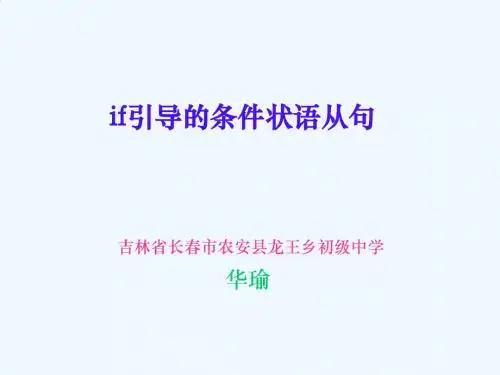
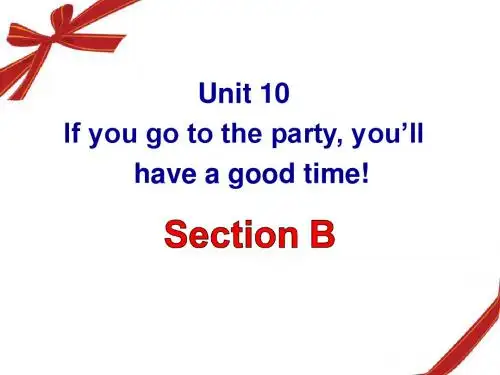
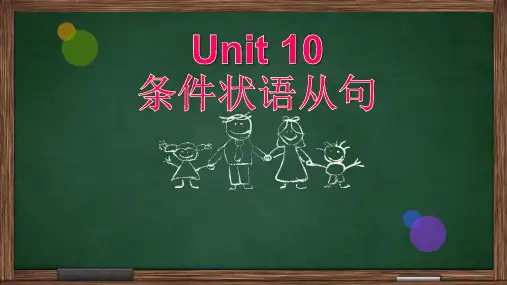
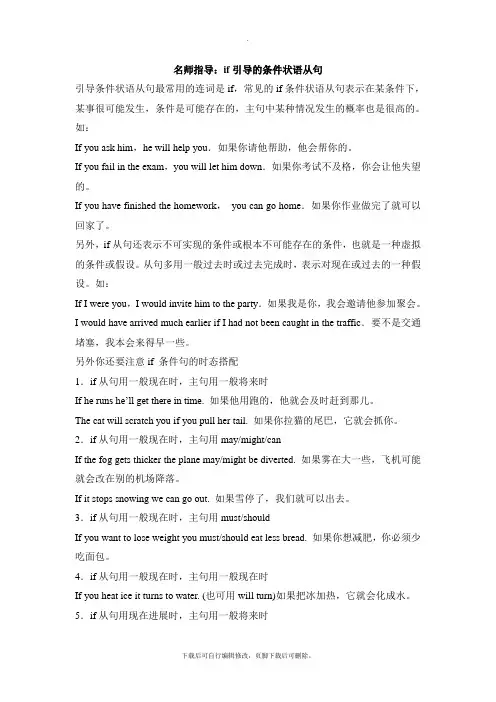
名师指导:if引导的条件状语从句引导条件状语从句最常用的连词是if,常见的if条件状语从句表示在某条件下,某事很可能发生,条件是可能存在的,主句中某种情况发生的概率也是很高的。
如:If you ask him,he will help you.如果你请他帮助,他会帮你的。
If you fail in the exam,you will let him down.如果你考试不及格,你会让他失望的。
If you have finished the homework,you can go home.如果你作业做完了就可以回家了。
另外,if从句还表示不可实现的条件或根本不可能存在的条件,也就是一种虚拟的条件或假设。
从句多用一般过去时或过去完成时,表示对现在或过去的一种假设。
如:If I were you,I would invite him to the party.如果我是你,我会邀请他参加聚会。
I would have arrived much earlier if I had not been caught in the traffic.要不是交通堵塞,我本会来得早一些。
另外你还要注意if 条件句的时态搭配1.if从句用一般现在时,主句用一般将来时If he runs he’ll get there in time. 如果他用跑的,他就会及时赶到那儿。
The cat will scratch you if you pull her tail. 如果你拉猫的尾巴,它就会抓你。
2.if从句用一般现在时,主句用may/might/canIf the fog gets thicker the plane may/might be diverted. 如果雾在大一些,飞机可能就会改在别的机场降落。
If it stops snowing we can go out. 如果雪停了,我们就可以出去。
3.if从句用一般现在时,主句用must/shouldIf you want to lose weight you must/should eat less bread. 如果你想减肥,你必须少吃面包。
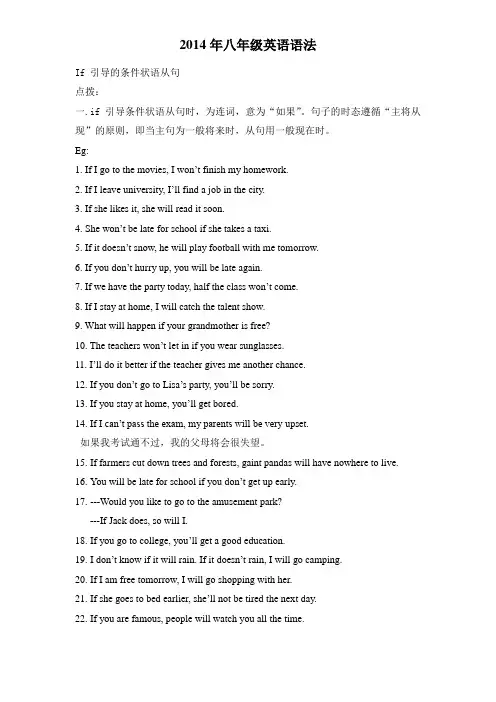
If 引导的条件状语从句点拨:一.if 引导条件状语从句时,为连词,意为“如果”。
句子的时态遵循“主将从现”的原则,即当主句为一般将来时,从句用一般现在时。
Eg:1. If I go to the movies, I won’t finish my homework.2. If I leave university, I’ll find a job in the city.3. If she likes it, she will read it soon.4. She won’t be late for school if she takes a taxi.5. If it doesn’t snow, he will play football with me tomorrow.6. If you don’t hurry up, you will be late again.7. If we have the party today, half the class won’t come.8. If I stay at home, I will catch the talent show.9. What will happen if your grandmother is free?10. The teachers won’t let in if you wear sunglasses.11. I’ll do it better if the teacher gives me another chance.12. If you don’t go to Lisa’s party, you’ll be sorry.13. If you stay at home, you’ll get bored.14. If I can’t pass the exam, my parents will be very upset.如果我考试通不过,我的父母将会很失望。

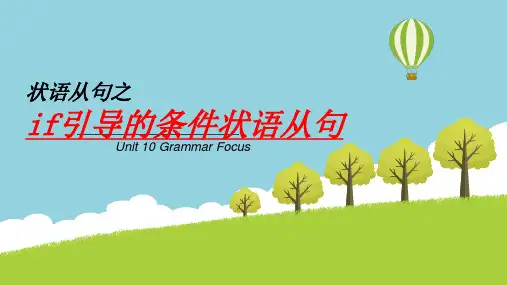

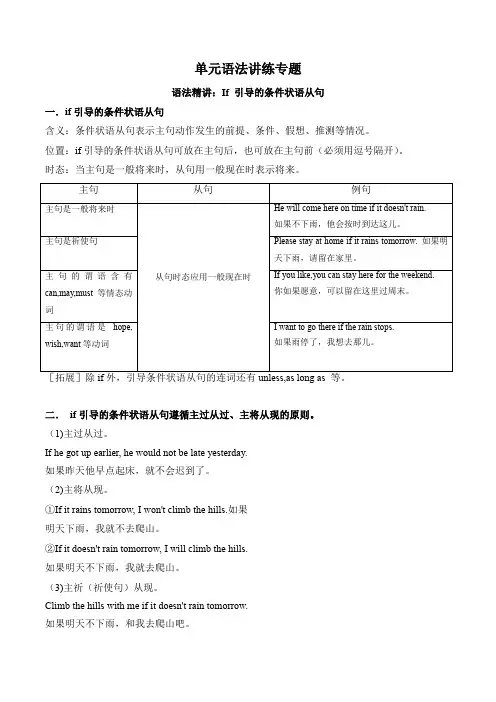
单元语法讲练专题语法精讲:If 引导的条件状语从句一.if引导的条件状语从句含义:条件状语从句表示主句动作发生的前提、条件、假想、推测等情况。
位置:if引导的条件状语从句可放在主句后,也可放在主句前(必须用逗号隔开)。
时态:当主句是一般将来时,从句用一般现在时表示将来。
主句从句例句主句是一般将来时从句时态应用一般现在时He will come here on time if it doesn't rain.如果不下雨,他会按时到达这儿。
主句是祈使句Please stay at home if it rains tomorrow. 如果明天下雨,请留在家里。
主句的谓语含有can,may,must等情态动词If you like,you can stay here for the weekend.你如果愿意,可以留在这里过周末。
主句的谓语是hope, wish,want等动词I want to go there if the rain stops.如果雨停了,我想去那儿。
二.if引导的条件状语从句遵循主过从过、主将从现的原则。
(1)主过从过。
If he got up earlier, he would not be late yesterday.如果昨天他早点起床,就不会迟到了。
(2)主将从现。
①If it rains tomorrow, I won't climb the hills.如果明天下雨,我就不去爬山。
②If it doesn't rain tomorrow, I will climb the hills.如果明天不下雨,我就去爬山。
(3)主祈(祈使句)从现。
Climb the hills with me if it doesn't rain tomorrow.如果明天不下雨,和我去爬山吧。
(4)主情(情态动词)从现。
If it doesn't rain tomorrow, I might climb the hills.如果明天不下雨,我可能会去爬山。
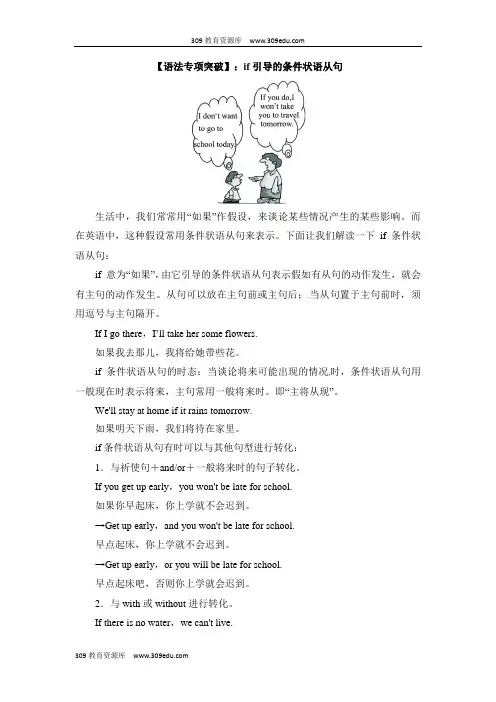
【语法专项突破】:if引导的条件状语从句生活中,我们常常用“如果”作假设,来谈论某些情况产生的某些影响。
而在英语中,这种假设常用条件状语从句来表示。
下面让我们解读一下if条件状语从句:if 意为“如果”,由它引导的条件状语从句表示假如有从句的动作发生,就会有主句的动作发生。
从句可以放在主句前或主句后;当从句置于主句前时,须用逗号与主句隔开。
If I go there,I’ll take her some flowers.如果我去那儿,我将给她带些花。
if条件状语从句的时态:当谈论将来可能出现的情况时,条件状语从句用一般现在时表示将来,主句常用一般将来时。
即“主将从现”。
We'll stay at home if it rains tomorrow.如果明天下雨,我们将待在家里。
if条件状语从句有时可以与其他句型进行转化:1.与祈使句+and/or+一般将来时的句子转化。
If you get up early,you won't be late for school.如果你早起床,你上学就不会迟到。
→Get up early,and you won't be late for school.早点起床,你上学就不会迟到。
→Get up early,or you will be late for school.早点起床吧,否则你上学就会迟到。
2.与with或without进行转化。
If there is no water,we can't live.如果没有水,我们就不能生存。
→We can't live without water.没有水我们不能生存。
1.如果if 引导的从句中用了will ,will 在此处是情态动词,表示意愿。
If you will help me ,I'll finish it on time.如果你愿意帮我,我会按时完成的。
2.在谈论将来可能出现的情况时,主句还可以是含有其他情态动词的句子或者是祈使句。

第10讲if 引导条件状语从句1、知晓条件状语从句结构及用法。
2、熟练掌握if引导状语从句的同义转换。
【拓展】if /when 引导状语从句和宾语从句这两种从句。
从句的时态的确定。
A.If B.And C.Be D.Or【答案】A【详解】句意:如果你不快点,你将错过公共汽车。
考查连词辨析。
if如果;and和;be是;or否则。
“you don’t hurry up”是错过公共汽车的条件,用if引导条件状语从句。
故选A。
考点2:if引导条件状语从句时态的确定1.—Would you like to go fishing with me this Sunday?—If it ________, I will go.A.doesn’t rain B.rains C.won’t rain D.didn’t rain【答案】A【详解】句意:——这个星期天你愿意和我一起去钓鱼吗?——如果不下雨,我就去。
考查时态。
if引导的条件状语从句,从句中用一般将来时,主句中用一般现在时,根据“If it..., I will go.”可知,此处表达“不下雨”。
故选A。
2.—What are you going to do this weekend?—We’ll go to have a picnic if it ________.A.rains B.is raining C.doesn’t rain D.won’t rain【答案】C【详解】句意:——这个周末你打算做什么?——如果不下雨,我们将去野餐。
考查条件状语从句。
rains第三人称单数形式;is raining现在进行时;doesn’t rain不下雨,一般现在时态;won’t rain一般将来时。
if引导的条件状语从句,主句一般将来时态,从句一般现在时态。
选项B、D不正确。
根据“We’ll go to have a picnic”可知,从句应该是“如果不下雨”,用否定形式doesn’t rain。
if引导的条件状语从句教学Teaching aims:Understand and know how to use the conditional clause.Teaching aids: pictures, computer, and little blackboard.Teaching procedures:Step 1 warming up:1.Play a song called“If you are happy, clap your ha nds.” And then the teacher sings the songwith the students together.2.Talk freely:There is a cat called Dudu.It is cute but lovely. It is unhappy, too. I think it may have some problems. Do you know the problems? If you are its owner, what will you do?3.Collect information:Write some sentences about “if” on the blackboard.①If you copy homework, you will start a bad habit.②She will be happy if she joins the party.③I will ask the teacher for help if I don’t understand.④If it’s fine tomorrow, we can go out.⑤Please call me if he is at home.⑥If you don’t hurry up, we will be late.⑦If you study hard, you will pass the exam.Step 2 Discuss and summarize:学生得出结论:①if意为“如果”,这种句子用来谈论事物的影响或者是后果。